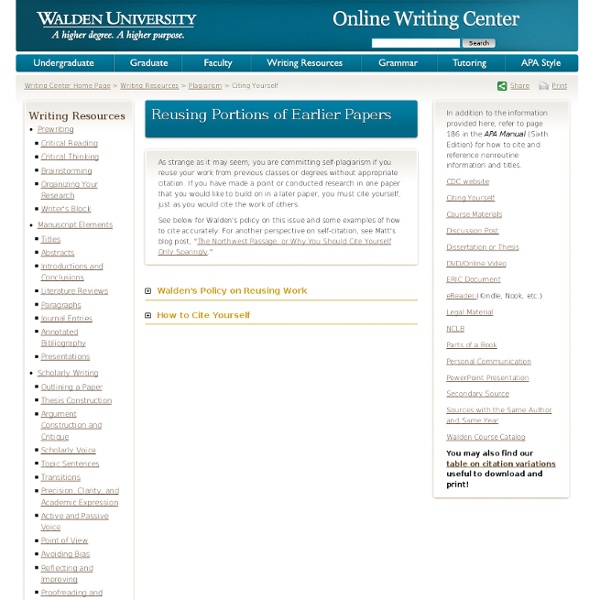Home - Citing Your Sources - Research Guides at Southern New Hampshire University - Shapiro Library
What exactly is plagiarism? Let's go to a source! As defined by Merriam-Webster's Collegiate Dictionary, 11th ed. to plagiarize is: "to steal and pass off (the ideas or words of another) as one's own : use (another's production) without crediting the source : to commit literary theft : present as new and original an idea or product derived from an existing source."
APA Formatting and Style Guide
This page is brought to you by the OWL at Purdue University. When printing this page, you must include the entire legal notice. Copyright ©1995-2018 by The Writing Lab & The OWL at Purdue and Purdue University. All rights reserved. This material may not be published, reproduced, broadcast, rewritten, or redistributed without permission. Use of this site constitutes acceptance of our terms and conditions of fair use.
Quoting, Paraphrasing, and Summarizing
It's Here: A new look for the Purdue OWL! The new version of the Purdue OWL is available at Worry not! Our navigation menu and content will remain largely the same.
EasyBib: Free Bibliography Generator - MLA, APA, Chicago citation styles
Avoiding Plagiarism
Summary: There are few intellectual offenses more serious than plagiarism in academic and professional contexts. This resource offers advice on how to avoid plagiarism in your work. Contributors:Karl Stolley, Allen Brizee, Joshua M. PaizLast Edited: 2014-10-10 09:01:36
Find, Read, & Cite Journal Articles
Other useful links: Basics Tutorial (w/audio), APA Style 6th Ed. Annotated Sample Paper, APA Style 6th Ed. (PDF) Summary Guidelines for Unbiased Language, APA Style 6th Ed. (PDF) Language Use for Gender,APA Style 6th Ed.
You can't make this stuff up: Plagiarism guideline paper retracted for...plagiarism
This could be an April Fools’ joke. But it isn’t. In what can only be described as an ironic twist, the Indian Journal of Dermatology is retracting a paper that presents guidelines on plagiarism for…wait for it… Plagiarism.
How to Cite Something You Found on a Website in APA Style
by Chelsea Lee Perhaps the most common question we get about APA Style is “How do I cite a website?” or “How do I cite something I found on a website?” First, to cite a website in general, but not a specific document on that website, see this FAQ.
Columbia says historian's acclaimed book on North Korea was plagiarized; publisher says it's been taken out of print
Charles Armstrong, Korea Foundation Professor of Korean Studies in the Social Sciences at Columbia University, plagiarized parts of his award-winning book on North Korea, Tyranny of the Weak: North Korea and the World, 1950-1992. He’s currently on sabbatical and will retire at the end of 2020, the university told Armstrong’s colleagues this week. “These findings were made in accordance with our policy, which required a confidential preliminary review by an inquiry committee, an investigation by a separate ad hoc faculty committee, oversight and recommendations by the university’s standing Committee on the Conduct of Research, and final decisions by the executive vice president for research and the provost,” Maya Tolstoy, dean of the Faculty of Arts and Sciences, wrote in an email to professors that was obtained by Inside Higher Ed. Armstrong declined to comment.



